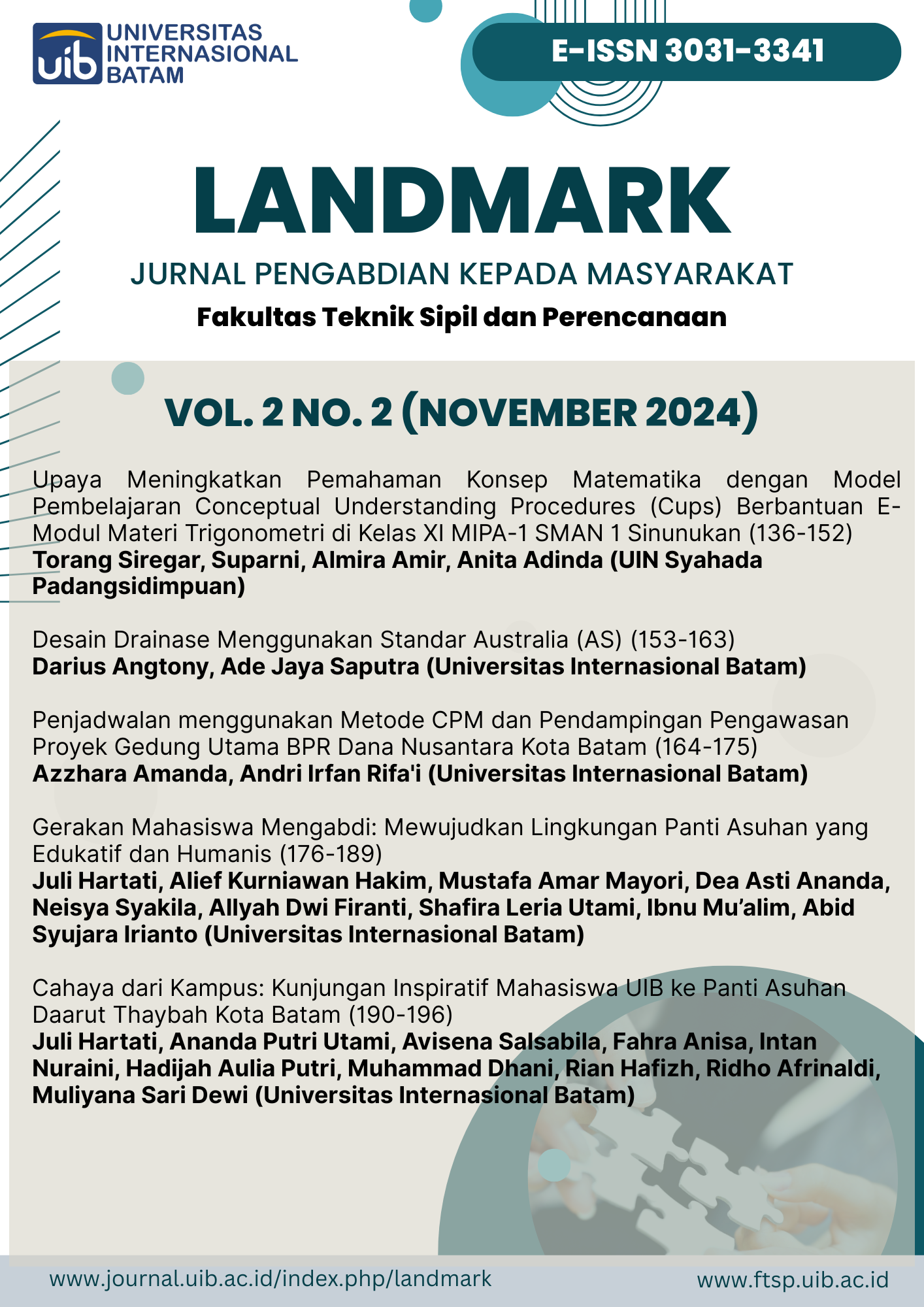Cahaya dari Kampus: Kunjungan Inspiratif Mahasiswa UIB ke Panti Asuhan Daarut Thaybah Kota Batam
DOI:
https://doi.org/10.37253/landmark.v2i2.10317Keywords:
Creativity, Camaraderie, Compensation, Relgious and Social assistanceAbstract
Visiting an orphanage is a tangible manifestation of the second principle of Pancasila: just and civilized humanity. This activity reflects care and compassion for others, especially for orphans who need moral, emotional, and financial support. During the visit to the Daarut Thaybah Qur’anic Boarding School and Orphanage Foundation, various activities were conducted, such as Qur’an recitation with the children, ice-breaking games, verse-connecting quizzes, and the distribution of basic necessities. This program not only brought joy to the children but also strengthened social solidarity among the group members. Values of love, empathy, and social responsibility formed the foundation of this initiative. The children became more motivated and felt appreciated, while participants learned the importance of sharing and caring for others. Overall, the activity had a positive impact by fostering empathy and enhancing both social and spiritual connections between the community and the children in the orphanage.
Downloads
References
Albaroroh, R. (2016). Interaksi sosial di panti asuhan dalam membentuk tingkah laku anak (Studi di Balai Rehabilitasi Sosial dan Pengasuhan Anak (BRSPA) Sleman, Yogyakarta. Universitas Islam Negeri Sunan Kalijaga.
Brake, A., & Kelly, M. S. (2019). Camaraderie, collaboration, and capacity building: A qualitative examination of school social workers in a year long professional learning community. Qualitative Report, 24(4), 667–692. https://doi.org/10.46743/2160-3715/2019.3779
Haryanti, D., Mega Pamela, E., Susanti, Y., Studi, P., Keperawatan, I., & Kendal, S. (2016). Perkembangan Mental Emosional remaja di Pantai Asuhan. In Jurnal Keperawatan Jiwa (Vol. 4, Issue 2).
Kumalasari, F., Pengajar, S., & Psikologi, F. (2012). Hubungan Antara Dukungan Sosial Dengan Penyesuaian Diri Remaja Di Panti Asuhan Latifah Nur Ahyani (Vol. 1, Issue 1).
Palittin, I. D., Wolo, W., & Purwanty, R. (2019). Hubungan motivasi belajar dengan hasil belajar siswa. Magistra: Jurnal Keguruan dan Ilmu Pendidikan, 6(2), 101-109.
Prima, E., & Lestari, P. I. (2019). Penerapan Token Economy untuk Meningkatkan Perilaku Prososial Anak Usia Dini. Jurnal Obsesi : Jurnal Pendidikan Anak Usia Dini, 4(1), 268. https://doi.org/10.31004/obsesi.v4i1.324
Saputra, A. J., Lu, S., Kenny, Mita, S., & Situmorang, E. (2021). PENINGKATAN FASILITAS DENGAN PEMASANGAN PAPAN NAMA DAN PENGELOLAAN SAMPAH MANDIRI BERBASIS MASYARAKAT DI PERUMAHAN BALOI MAS ASRI. Prosiding National Conference for Community Service Project (NaCosPro), 298–306. http://journal.uib.ac.id/index.php/nacospro
Saputra, A. J., Wibowo, P. H., Saputra, T., Immanuel, Y., Immanuel, G., Hermawan, R., & Wahyudi, M. A. (2022). Bahaya Narkoba Bagi Generasi Muda. Prosiding National Conference for Community Service Project (NaCosPro), 384–391. http://journal.uib.ac.id/index.php/nacospro
Windarto, W. (2021). Kode etik guru dalam pengaplikasian media pembelajaran online PAI di era revolusi industri 4.0. Al Qalam: Jurnal Ilmiah Keagamaan dan Kemasyarakatan, 15(1), 15-27.
Wuryandani, W., Maftuh, B., Sapriya, S., & Budimansyah, D. (2014). Pendidikan karakter disiplin di sekolah dasar. Cakrawala Pendidikan, (2), 87637.







